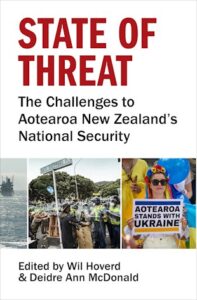Reviewed by Dan Wildy2
Review published in National Security Journal, 23 December 2023
Download full PDF version – Book Review – State of Threat: The Challenges to Aoteoroa New Zealand’s National Security (495 KB)
Wil Hoverd & Deidre Ann McDonald (ed), State of Threat: The challenges to Aotearoa New Zealand’s national security, Massey University Press (Auckland, 2023). ISBN 9781991016522. 336 pages.

State of Threat: The Challenges to Aotearoa New Zealand’s National Security provides a range of relevant and thought-provoking perspectives on the National Security environment. However, the framing of the book’s substantive content within the introduction and conclusion is potentially alienating to both a general reader and to someone with extensive experience in the sector. This was disappointing and detracts from what is otherwise a useful contribution to our national security literature.
The book’s introduction uses excessive jargon and specialist language drawn from Critical Theory. As a professional in the National Security sector, the use of this dense language was an unwelcome distraction from what should be a clear-eyed account of the contemporary national security environment and its challenges.
As the introduction progressed, references to intersectionality, social constructivism, and “prioritised discourses that contain inherent bias associated with their hegemony (wealth, education, whiteness, heteronormativity and maleness)”, left me wondering how long it would be before we knuckled down into topics like great power competition, cyber security, violent extremism, and vulnerabilities in our economic system.
The conclusion was equally problematic. As in the introduction, the assertions made lack substantiating references, and the claim that current conceptions of national security are “overwhelmingly white, educated, and male…” also runs counter to my own experience as a security professional across a quarter of a century.
As a leader in the national security sector, attracting a diverse range of people to a challenging and fulfilling career is an enduring pre-occupation. Stewardship is at the heart of every public service leader’s responsibilities. To that end, I wish to highlight my own experiences in the hopes that it encourages a diverse range of people to the sector, rath-er than discourage them, which I fear this book’s framing may do.
My first boss as an Officer Cadet in the NZ Army – a Captain, was a woman and gay. Of all those I have served under, she is the archetype upon which I’ve sought to model my own leadership style. She was followed closely in this regard by her second-in-command – a Māori Staff Sergeant from Rotorua who epitomised servant leadership. On graduation as an officer into the Army, my first commander was also a woman (now a DCE within the national security sector) – again someone who I have sought to model in my own approach to leadership. During a key period in my career the Chief of Army was Major General Jerry Mateparae, later Lieutenant General Sir Jerry Mateparae and Governor General of New Zealand. And when I left the Army, the first CE I had in the Intelligence and Security Sector was also a woman, celebrated for her leadership, stewardship, and professionalism.
In short, my experience is that many of the most accomplished and influential people within the national security sector come from a diverse range of backgrounds. Further, it was my experience that their colour, gender, and sexual orientation had no bearing on how they were viewed by me or my contemporaries. What mattered was their character and competence, not surface level characteristics. As Sir Wira Gardiner once remarked, ‘When your life depends on the actions and snap decisions of others you inevitably become more concerned about the qualities of dependability, consistency, integrity and professionalism rather than race, gender or creed.’1 This is one of the redeeming and most attractive aspects of national security discourse, careers, and organisations. While academic critique and abstract notions contained within Critical Theory have their place, a book aimed at an audience primarily focused on practical, real-world, means to get important things done is not that place.
______________________
2 Dr Dan Wildy is currently the NZ Police Director of National Intelligence, Police National Headquarters in Wellington. Dr Wildy has previously served in the NZ Army, has an extensive intelligence background and is currently the Chair of the New Zealand Institute of Intelligence Professionals.
